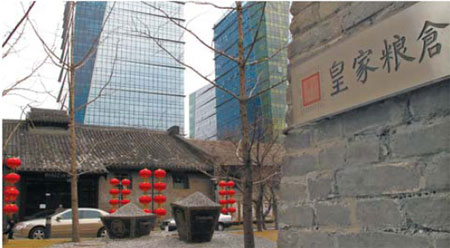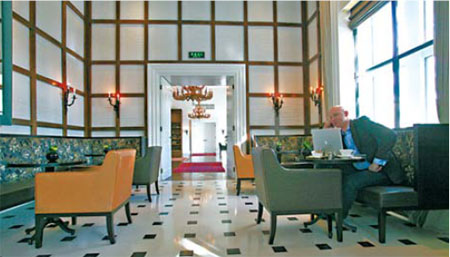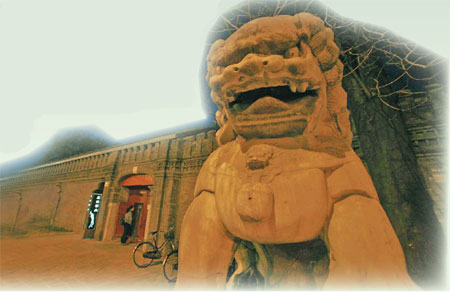|

|
|
The Imperial Granary, built 600 years ago, now offers Kunqu Opera every weekend. |
With the emergence of new buildings like the CCTV Tower, Bird's Nest and T3, Beijing is metamorphosing into a modern city at an unprecedented speed. At the same time, however, there is also a countercurrent of going back to old houses in the city.
Nowadays you can go to a concert of traditional folk music at the Mawood Theater or a Kunqu opera at the Imperial Granary, both converted from buildings of the Ming Dynasty (1368-1644). You can also see an art exhibition or enjoy dinner at one of the Michelin-starred restaurants at the Ch'ien Men 23, the United States Embassy in the late Qing Dynasty (1644-1911), or go to a rock gig at the Yugong Yishan Club, which was part of government house in the 1920s.
"I like old buildings because they have more character and you can embrace history there," says Handel Lee, executive chairman of the Ch'ien Men 23 (www.legationquarter.com), which is to the southeast of the Tian'anmen Square, at 23 Qianmen East Street.
Today's Ch'ien Men 23 was built in 1903 as the former US Embassy. In the second half of the 20th century, it also served as the Dalai Lama's residence, foreign minister's office and the former Diaoyutai State Guesthouse.
Today, the five neo-classical buildings have been developed into a trendy compound for dining, shopping, art and entertainment, including six restaurants, an art gallery and a studio theater.
"The idea is to revitalize these historical buildings to provide a place for people to enjoy a combination of past and current Chinese lives, an experience one can only get in China," says Lee, an American-Chinese who was born in 1961 in the US and has been living in China since 1991.
Ch'ien Men 23 is the third project that Lee has developed in China, after the Courtyard Gallery, housed in a traditional Chinese courtyard just outside the Forbidden City, and Three on the Bund, a complex of restaurants, fashion stores and art gallery in a historical building on Shanghai's Bund.
"While trying our best to protect the historical buildings, we are also trying to make them come back to life," Lee says.
In order to bring back the original look of Ch'ien Men 23, Lee and his designer referred to old pictures of the former US Embassy, including photos from the Library of Congress in the US. They also rebuilt a demolished gate of the US Embassy on the street of Dongjiao Minxiang, which was the area for foreign embassies in Beijing during the Qing Dynasty.
"Projects involving historical properties are very challenging. We spent four years on Three on the Bund and five years on Ch'ien Men 23 before they opened," says Lee. "It's not like developing new apartments, which can bring quick rewards, but I believe they can contribute to the urban culture by showing people the past with new dynamics."
If the Ch'ien Men 23 Quarter is reminiscent of a time when China began to open to the world, the Mawood Theater (www.mawood.com.cn) places one in a time further back in Chinese history.
Tucked in a small hutong near the Drum and Bell Towers of Beijing, the Mawood Theater was originally the worship hall of the Hong'en Taoist Temple, built in the Ming Dynasty. In the late Qing Dynasty, it became the home of a eunuch named Liu Suyun, who renovated the temple. After the overthrow of the Qing court, many eunuchs expelled from the Forbidden City also lived there.
|

|
|
The newly decorated Ch'ien Men 23 was built in 1903 and was the former US Embassy. |
After the founding of New China in 1949, the halls of Hong'en Temple became storage rooms and workshops of the Beijing No 2 Factory of Standardized Parts and Components, while the front courtyard became a market.
When Guo Yong, a musician from Guizhou province, saw the Hong'en Temple for the first time last year, he immediately fell in love with it, although it looked dusty and worn-out at that time.
"It seemed to me at once that there was a kind of vital energy in the place which could turn a musical performance into an unusual experience," says Guo. "The sound is excellent here, as the uneven surfaces of the wooden beams and columns from long-time wear and tear naturally absorb excess reverberations."
Guo didn't change the temple hall much, other than setting up sound and light equipment, and giving it the new name of "mawood", which comes from "mawu", a Guizhou dialect term that refers to a state of mind when one gets a little drunk.
"The main orientation of Mawood Theater is world music, which is appropriate here as both the music and venue are very old," he says.
On Christmas Eve last year, Mawood Theater held its first performance, a concert of Mongolian folk music by a band called Hanggai.
"I never knew this Taoist temple before this concert. There was a magical effect when music was played in this old building," says Yang Ran, a young woman who attended the first performance in Mawood Theater.
 |
|
A stone lion still guards the former government building of Duan Qirui, which now houses the Yugong Yishan Club. |
The theater has also held performances of traditional music by the Miao ethnic group from Guizhou, and a fusion of Chinese and European jazz. Now Guo is preparing to produce a musical in the venue and hopes to elevate Mawood Theater into a center of world music in Beijing.
"The experience of listening to music in this ancient venue cannot be reproduced. I think the place itself can attract people to come and enjoy the atmosphere," Guo says.
Lu Zhiqiang, director of the Yugong Yishan Club, believes that programs are more important than venues. Housed in the former government building of Duan Qirui, who was provisional chief executive of the Republic of China from 1924 to 1926, the club is a sub-culture venue that holds rock gigs, films, dramas and parties.
"We do anything interesting. It is a small cultural center. We even provide this place for senior people to sing Peking Opera for free every Sunday afternoon," says Lu.
Yugong Yishan Club moved to the present venue in 2007 after its former site near the Workers' Stadium was demolished. "We moved here mainly because this place is convenient and quiet. Without many neighbors, we don't have to worry about disturbing others," says Lu.
From the outside, not much sign of the history of the building can be found, except for two stone lions that stand to the east of the club, at the formal entrance of the former government house. However, inside the club, the chairs bear images of many historical figures who used to live or work here, reminding one of the destiny of the time-weathered place.
The name "Yugong Yishan", or "Foolish Man Removes the Mountains", refers to an ancient story about an old man who tried to remove two great mountains that obstructed the way. Ridiculed by some, the old man insisted that with his efforts and those of his descendents, the task would be realized in time.
Lu says that his idea is to do things bit by bit, like the foolish old man.
Xie Li, a program officer with ICOMOS (International Council on Monuments and Sites) China, a non-government organization devoted to the protection and re-use of cultural relics, believes that proper reconstruction of historical buildings will help protect them.
"It is not meaningful if the work of protection is limited to people of the circle," she says. "Appropriate re-adaptation of historical buildings not only extends their vital force, but also promotes the consciousness of protection."
However, she points out that China still lacks detailed rules for the reconstruction of historical buildings, so that protection and design are still not well integrated.
"If we can readapt historical buildings on a more integrative level, we will be able to better protect them," she says.
(China Daily March 24, 2009)